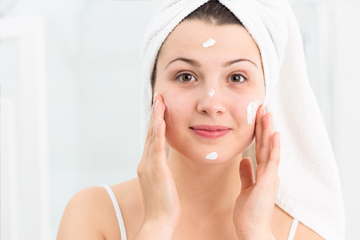The aging process is one thing that we cannot stop. Observable facial lines develop over time and the skin becomes drier. These changes can make you look older than you are, and largely depend on your genes. The medical term for this type of aging is “Intrinsic aging”. Another sort of aging that impacts your skin is one that we can control. Our lifestyle choices can impact the aging process of our skin, a process termed “extrinsic aging”. We can lessen the effects that this form of aging has on our skin by taking some preventive measures.
- Defend yourself against the sun: It is common knowledge that prolonged exposure to the sun can harm your skin, causing wrinkles and early aging. Routine sunscreen application can delay the appearance of these effects. Applying an SPF of between 30 and 50 every day, even when it’s cloudy, can shield your skin from the sun’s harmful ultraviolet (UV) rays. Don’t skip sunscreen just because it isn’t sunny because UV rays pass through the clouds. Wear a wide-brimmed hat, light-colored clothing that will reflect the sun, and UV-protective eyewear for added protection.
- Moisturize: The skin can benefit from moisturizing and nourishing products. For the face, a moisturizer functions like a sip of water. Moisturizing is especially crucial as you age because as skin dries out and wrinkles appear sooner. According to research, applying a moisturizer with hyaluronic acid and vitamin C is particularly beneficial for preventing wrinkles from forming or deepening.
- Stay hydrated: Water consumption is crucial for optimum health. Water is essential for practically all of your body’s processes. In addition to helping you digest food and controlling your body temperature, drinking water keeps your skin healthy and hydrated from the inside. A 2017 study discovered that consuming the leaf extract of lemon balm, which is generally consumed in tea, may help improve skin suppleness and repair tissue damage.
- Sleep on your back: A 2016 study found that a person’s sleeping position can have an impact on the appearance of wrinkles. According to the study, sleeping on one’s stomach or side exposes one to mechanical compression forces that can cause facial skin to stretch and wrinkle more quickly. Try sleeping on your back rather than your side or stomach to avoid this. Silk pillowcases may be gentler on your skin than cotton ones since they cause less friction and less skin abrasion.
- Relax: Repeated facial expressions like squinting, frowning, or lip-pursing might hasten the development of wrinkles. If you notice that you squint a lot, you may need to have your eyes tested or you may require a stronger prescription for your glasses or contact lenses. Getting a fresh prescription might be advantageous for both your eyes and your skin. If you frequently scowl or frown, consider trying stress-relieving techniques. Some effective stress-reduction methods are:
- routine exercise
- exercises for deep breathing
- yoga \meditation \mindfulness
- Apply retinoids: One of the most well researched anti-aging substances, retinoids, which are produced from vitamin A. Retinoids, also known as retinols, have the power to boost the production of collagen, which keeps the skin looking smooth. Retinoids encourage the growth of new blood vessels and skin regeneration, which could help improve the skin’s overall appearance and texture. Retinoids come in different categories, each with a varying level of efficacy. Some are available as over-the-counter lotions and gels, while others can only be obtained with a prescription. Dermatologists advise using the product every other day to prevent peeling and starting with a little amount to determine your skin’s tolerance to the treatment. Consult a dermatologist to know which is the right option for your skin.
- Eat vitamin-rich foods: “You are what you eat,” is a proverb that you’ve probably heard. This is especially true when it comes to your skin. Dietary choices are linked to facial wrinkles, particularly in women, according to a Dutch study with more than 2,700 participants. The study found that women who consume more red meat and unhealthy snacks tend to have more face wrinkles than those who consume more fruits. Foods with strong anti-inflammatory or antioxidant capabilities may also increase the suppleness of the skin and guard against premature skin aging and damage. Some examples of these foods are:
- flax seeds
- olive oil
- pomegranates
- avocados
- green tea
- salmon
- vegetables, especially carrots, pumpkin, leafy greens, bell peppers, and broccoli
- Avoid smoking: Collagen and elastin, the fibers that give your skin its flexibility and strength, are harmed by tobacco smoke. Additionally, the nicotine in cigarettes narrows your blood vessels and decrease blood flow. Your skin receives less oxygen as a result. Additionally, it will restrict the amount of crucial nutrients like vitamin A that can reach your skin. Additionally, frequent lip-pursing for inhalation might hasten the onset of wrinkles around the mouth. Consult your healthcare physician about a smoking cessation program if you smoke and want to stop.
- Minimize stress: Reduce stress by cutting back on anything that makes you anxious or could be contributing to your wrinkles. Meditation and yoga are also beneficial.
- Use a high-quality anti-wrinkle cream: Using a tiny bit of anti-wrinkle cream or serum under your day and night cream and moisturize and safeguard your skin.
Making lifestyle adjustments can help people who already show premature skin aging symptoms. You can provide your skin a chance to partially repair the damage by protecting it from the sun. When smokers quit, their skin starts looking better. You can visit a dermatologist if you are bothered by the signs of aging skin. Many people now have skin that looks younger because to new procedures and less invasive treatments for wrinkle reduction, skin tightening, and complexion enhancement.

